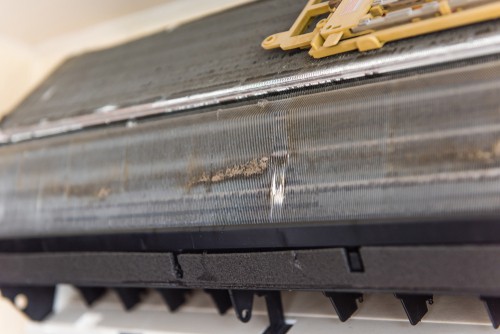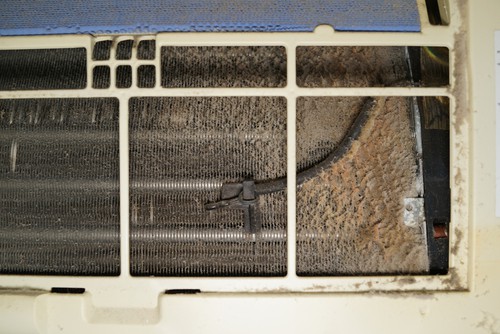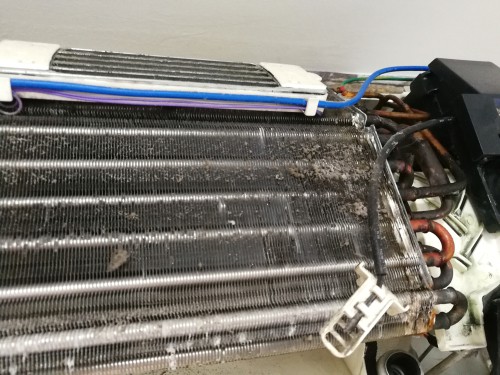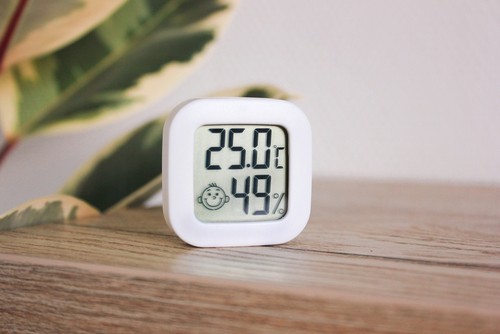
How Does Mold Grow in Aircon? You enjoy the comfortable air conditioning in your home, but lately, you’ve noticed that it’s been smelling funny. You decide to investigate and discover mold growing on your air conditioner.
That’s not good, and it needs to be fixed immediately! In this article, we’ll discuss what causes mold growth on air conditioners, why it happens, and how you can prevent mold from growing on your AC unit again so you can breathe easily.
How Does It Happen?

Mould in the aircon occurs when there’s a leak in the system. The leak can be caused by many things, such as a clogged drain line, cracked or deteriorated components, or condensation buildup. The leak allows water to get into the system, and the water causes condensation buildup.
As the temperature changes between hot outside and cold inside, the water changes from liquid to gas and back again. When water condenses, it releases water vapor. Water vapor is invisible to the naked eye and can be quite volatile, which is why it smells when it condenses.
Condensation on an air conditioner’s evaporator coil is just nasty-smelling water vapor that’s mixed with the condensed moisture from its previous condensate.
If the evaporator coil is located inside an insulated casing, the moisture won’t be able to escape to the outside and will start to grow mold. As long as there’s a leak in the system, condensation will continue to collect on the evaporator coil and mold will continue to grow. The longer the leak goes on, the greater the chance of mold growth.
What Causes Mold Growth?

Mold growth can be prevented by ensuring that your air conditioner and its components are maintained properly. The evaporator coil should be cleaned regularly and should be kept free of mold growth before it’s allowed to spread. If the evaporator coil is located inside an insulated casing, condensation will still be able to occur, but it will be diluted enough to prevent mold growth.
How to Check for Mold in Your Air Conditioner

The easiest way to find mold in your air conditioner is to remove the front cover and check for it. Look at the evaporator coil, and if you notice black, blue, or green spots of mold growing on the coil, you’ll know that it’s time to call a professional for repairs. The source of the leak can be difficult to find, so you may need to get a professional to find it for you.
Cleaning the Coil
If you find mold growing on your evaporator coil, the best thing to do is to clean it. If you’re not sure how to do it, call an air conditioning repair technician. The last thing you want is to make the mold problem worse by making a mistake while trying to clean it yourself.
Preventing Mold in Your Air Conditioner

There are a few things that you can do to prevent mold growth in your AC unit.
1. Check for Leaks
If you notice any sign of water leaking from your air conditioner, it’s time to call a repair tech to check it out. The coil will get wet, and mold will start to grow in the coming hours or days.
2. Make Sure Your Unit is Clean
Keep your air conditioner dry. You need to clean the unit with a specialized AC cleaning solution, which isn’t natural. That way, you will kill the mold spores before they have a chance to grow.
After that, you need to use a de-humidifier to keep moisture levels low and prevent mold and mildew from growing. If your unit has too much moisture in it, do not fix the problem yourself; call an air conditioning repair technician.
3. Change the Filter
A dirty filter allows mold spores to collect, and they’ll only grow bigger over time. To prevent this, replace your filter every three months or as soon as you notice a drop in performance.
4. Clean Your Drain Line
If your drain line is clogged, it will cause condensation to build up inside your system. This condensation will cause mold to grow. To prevent this from happening, clean the drain line regularly.
5. Insulate Your Unit
Insulating the evaporator coil allows for more airflow and prevents condensation from forming on the evaporator coil, keeping it clear of mold growth. If you choose not to insulate your unit, there’s a greater chance of your AC unit getting moldy.
What to Do If You Have Mold in Your Air Conditioner

If you find mold, call a professional air conditioner repair technician. The best choice is to hire a contractor so you don’t have to take the risk of making your problem worse.
Make sure to clean the unit well after letting it dry. If there’s mold on your evaporator coil, some of it will be stuck in there, and you need to use a specialized cleaning solution that won’t leave any residue on the evaporator coil or cause corrosion. Be careful if you decide to use vinegar as a natural alternative for AC cleaning because it can create residue, which will damage your evaporator coil and start mold growth again.
Stopping Mold In Problem Areas
If you have any exposed plumbing or other areas that seem to always have condensation buildup, take a minute to look for moldy spots. If you find it, fix the problem.
You’ll also need to prevent mold from growing in those areas by installing proper insulation and wiping them down once in a while. The best way to do that is to call an air conditioning repair technician.
Maintaining Good Indoor Air Quality

How Does Mold Grow in Aircon Maintaining good indoor air quality helps stop mold growth. It’s not enough to have a clean AC unit. You also have to keep the rest of the house clean and dry. The less moisture you have in your home, the less likely that mold will grow.
How Does Mold Grow in Aircon? – Conclusion

How Does Mold Grow in Aircon? If you’ve found mold in your AC system, you need to call a professional air conditioner repair technician immediately. Most people only realize that they have a mold problem when they’re breathing moldy air, which can be damaging to their health in more ways than one.
If you decide to do it yourself, you’ll just make your problem worse by not following proper cleaning procedures. That will give rise to the problem in the first place.
If you’ve noticed mold growth on your air conditioner, it’s best to get it fixed right away. Not only because it can be a danger to your health, but because mold can destroy your AC unit and leave you with costly repairs or replacements.
